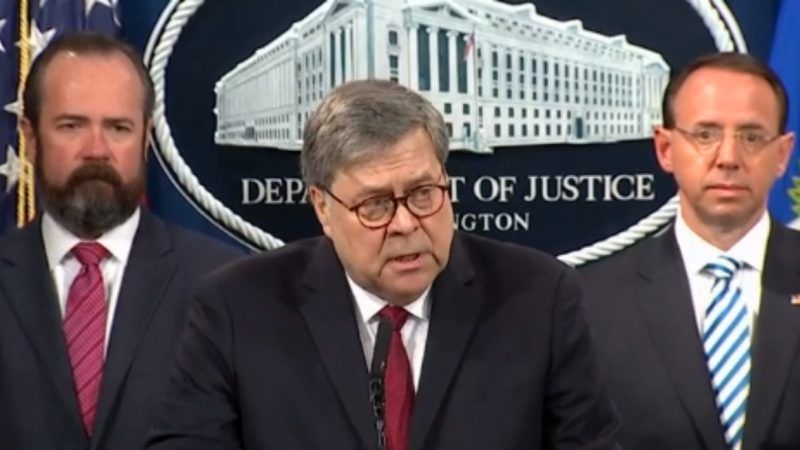Bill Barr 'Disagreed' with Some of Robert Mueller's 'Legal Theories' on Obstruction
In a press conference shortly before Mueller's report was released to the public

Special Counsel Robert Mueller's report on Russian meddling in the 2016 election details 10 episodes involving possible attempts by President Donald Trump to obstruct justice, Attorney General William Barr said at a press conference this morning. Barr also said that Mueller "did not find any conspiracy to violate U.S. law involving Russia-linked persons and any persons associated with the Trump campaign."
"So that is the bottom line. After nearly two years of investigation, thousands of subpoenas, and hundreds of warrants and witness interviews, the special counsel confirmed that the Russian government sponsored efforts to illegally interfere with the 2016 presidential election but did not find that the Trump campaign or other Americans colluded in those schemes," the attorney general added.
And here's the relevant portion of Barr's remarks about those "10 episodes," which are likely to drive the news cycle today:
The report recounts 10 episodes involving the president and discusses potential legal theories for connecting these actions to elements of an obstruction offense.
After carefully reviewing the facts and legal theories outlined in the report, and in consultation with the Office of Legal Counsel and other department lawyers, the deputy attorney general and I concluded that the evidence developed by the special counsel is not sufficient to establish that the president committed an obstruction-of-justice offense.
Although the deputy attorney general and I disagreed with some of the special counsel's legal theories and felt that some of the episodes examined did not amount to obstruction as a matter of law, we did not rely solely on that in making our decision. Instead, we accepted the special counsel's legal framework for purposes of our analysis and evaluated the evidence as presented by the special counsel in reaching our conclusion.
So why did Barr decide not to pursue obstruction of charges? It's all about Trump's "intent," he said. "The president took no act that in fact deprived the Special Counsel of the documents and witnesses necessary to complete his investigation," Barr explained. "Apart from whether the acts were obstructive, this evidence of non-corrupt motives weighs heavily against any allegation that the president had a corrupt intent to obstruct the investigation."
The attorney general also claimed that "Trump faced an unprecedented situation," with "relentless speculation in the news media" regarding his "personal culpability."
"There is substantial evidence to show that the president was frustrated and angered by a sincere belief that the investigation was undermining his presidency, propelled by his political opponents, and fueled by illegal leaks," Barr said.
As Reason's Scott Shackford explained Wednesday, federal prosecutors often use obstruction of justice to get convictions. If they can't find evidence of an underlying crime, they look to prove process crimes (such as lying to FBI) instead. This is what happened to Martha Stewart. Back when he was a federal prosecutor, former FBI Director James Comey indicted her for obstructing justice during an insider trading investigation. Stewart was not actually charged with insider trading, though she went to prison anyway.
So if Trump did indeed not collude with Russia, it's a good thing that he won't face charges for any possible process crimes. As Shackford noted: "Some people really, really want to believe that Trump must have done something to have kept Mueller from finding evidence of coordination with the Russians. So they are invested in trying to use obstruction to accomplish what the primary investigation could not: unseat Trump."
One other noteworthy part of Barr's* press conference had to do with the Russian GRU intelligence agency's efforts to hack the Democratic National Committee's servers and publish the stolen information. "The special counsel also investigated whether any member or affiliate of the Trump campaign encouraged or otherwise played a role in these dissemination efforts," Barr said. "Under applicable law, publication of these types of materials would not be criminal unless the publisher also participated in the underlying hacking conspiracy."
This, as it happens, is what federal prosecutors are charging WikiLeaks founder Julian Assange with doing in an unrelated case. They say he helped Chelsea Manning hack government computers. Publishing the resulting information, as Barr pointed, is not in itself a crime.
The Mueller report was released to the public shortly after the press conference. Reason's Shackford will be analyzing its contents and writing about them, so stay tuned.
*CORRECTION: This post originally stated that the press conference in question included remarks from Special Counsel Mueller, rather than Attorney General Barr. I regret the error.
